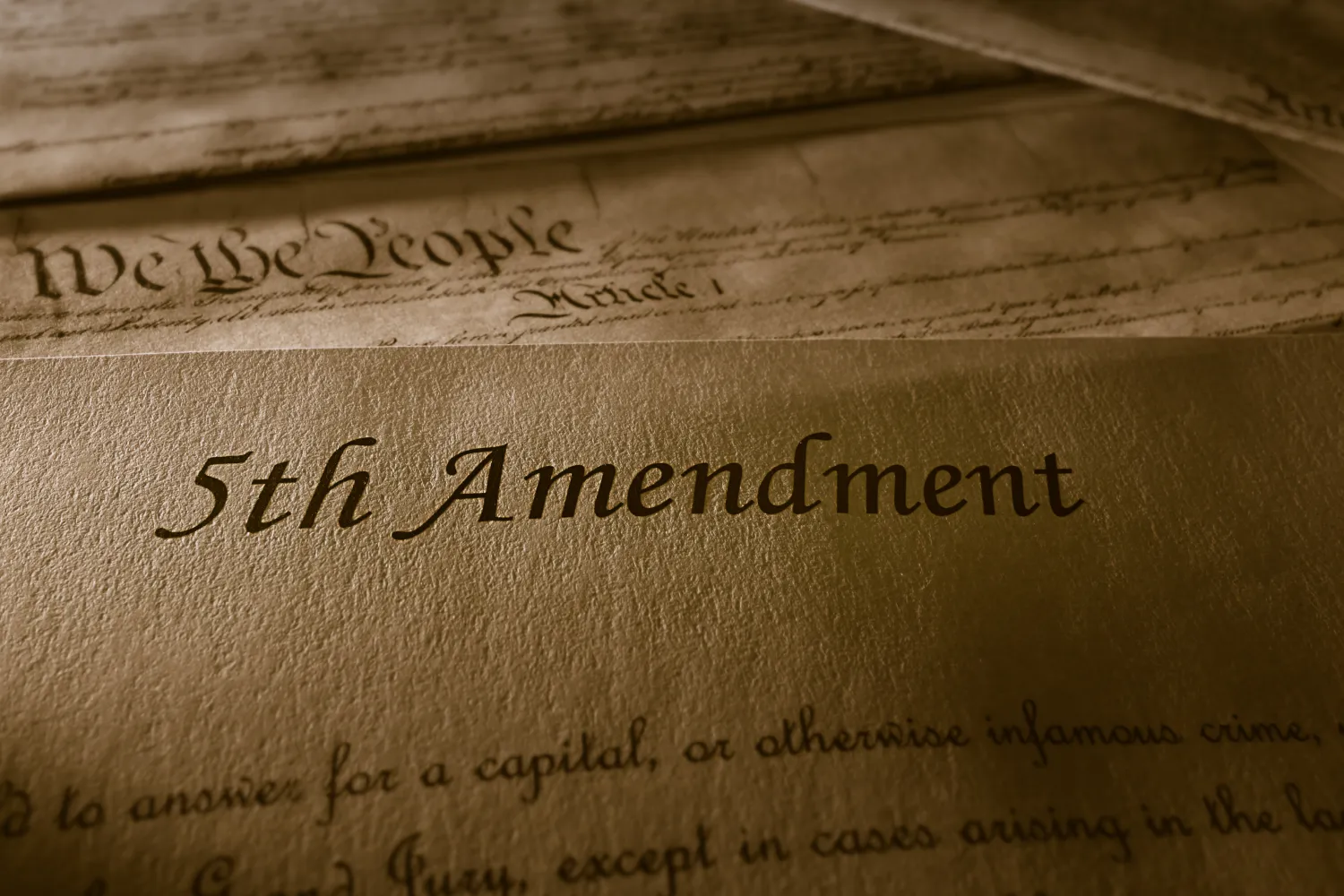Have you ever heard someone say, “I plead the Fifth,” and wondered what it really means? It’s not just a catchy phrase from your favorite legal drama; rather, it holds significant weight in the American legal system.
Under the Fifth Amendment of the U.S. Constitution, this phrase acts as a shield against self-incrimination, a fundamental aspect of our legal rights. As a protection, the Fifth Amendment can greatly impact the course of a criminal case.
And so, whether you’re on trial or on a jury, understanding this constitutional right can make or break a case. To that end, if you or someone you love is ever in need of seasoned legal advice, especially after a construction accident in New York, please remember that Schwartzapfel Lawyers is just a call away.
To learn more about your rights at no charge, schedule a free consultation by visiting us online or calling 516-342-2200 today.
What Is The Fifth Amendment?
So, what does “I plead the Fifth” mean? When we talk about the Fifth Amendment, we’re getting into one of the most significant protections in the U.S. Constitution, which explains rights such as our right not to self-incriminate and double jeopardy. Let’s take a closer look below:
Self-Incrimination
This is the heart of the Fifth Amendment. It’s about protecting individuals from being forced to testify against themselves. In short, you can’t be compelled to testify in a way that might paint you in a criminal light. It’s a safeguard in our justice system, ensuring fair play and due process of law.
Criminal Cases And Grand Juries
The Fifth Amendment specifically comes into play in criminal law. It’s a layer of defense from the moment police custody begins, throughout legal proceedings, and up to the point of a criminal trial.
When facing a grand jury or a subpoena, this amendment gives you the privilege against self-incrimination, allowing you to remain silent if your words could lead to criminal charges.
Double Jeopardy
Have you ever heard of the concept of double jeopardy? As another protection under the Fifth Amendment, it prevents individuals from being tried for the same crime twice. In essence, it means that once you’re acquitted or convicted, that’s it — you cannot be brought back into court for the same offense. In this way, the principle aims to maintain the integrity of legal outcomes and respects the finality of court decisions.
Understanding these key aspects of the Fifth Amendment is helpful if you or a loved one is involved in a legal dispute. If you need assistance with mounting an effective defense, the qualified team of Schwartzapfel Lawyers is here to help. Reach out to us at 516-342-2200 for practical advice that’s tailored to your unique situation.
What Is The Scope And Limitations Of Pleading The Fifth?
Knowing how to use the Fifth Amendment at the right time and under the right circumstances can be confusing. In the end, it’s about finding the best possible balance for yourself and your rights. To help with this, we’ll examine when and how you can invoke this crucial constitutional right:
When Should I Plead the Fifth?
The Fifth Amendment is applicable during specific legal situations. As a protection, it applies when your testimony could open the door to criminal prosecution.
The Nature Of Self-Incrimination Protection
The Fifth Amendment protects you from having to be your own accuser. It applies to both verbal testimony and the production of documents that may lead to criminal charges being brought against you.
This right is a cornerstone of our justice system, upheld by the Supreme Court and ingrained in the United States Constitution. Without it, our legal system would be vulnerable to grave abuses of individual protections and other miscarriages of justice.
Criminal Trial vs. Civil Case
While pleading the Fifth can be a helpful tool in criminal trials, doing so in a civil case may lead to adverse inferences by the judge or jury. In simpler words, your silence could be taken negatively as an indication that you have something to hide.
What Are The Real-World Implications Of Pleading The Fifth?
Now, let’s translate this into the real world — where the law meets life. So, what does pleading the Fifth look like in action?
In the courtroom, how you use your Fifth Amendment right is critical. It’s a strategic move to be discussed with your criminal defense attorney.
That said, using it can prove a double-edged sword due to how it’s perceived on a human level. For instance, a collateral consequence, the ripples of pleading the Fifth can reach your workplace or otherwise mar your public image. Additionally, invoking the Fifth in high-profile cases can stir up a media storm.
As you think about your Fifth Amendment rights, remember that having a knowledgeable team by your side is invaluable at every stage. At Schwartzapfel Lawyers, we understand the nuances of the Fifth Amendment and how to use it effectively.
So, please, don’t wait if your future is on the line. Instead, act now and give us a call at 516-342-2200 or visit us online today. No matter your situation, we’re ready and able to fight for you and your rights to make sure that you’re legally protected every step of the way.
The Role Of Legal Representation
A criminal defense attorney is your guide and protector when faced with legal matters. But what makes them essential, and why should you strongly consider hiring one in cases where you might need to plead the fifth? Here’s a look at why their role is so important:
Guidance Through Legal Tangles
The legal world can be intimidating, but a seasoned attorney helps simplify it for you. They don’t just represent you in court; they’re your advisor, strategist, and confidant. Whether it’s deciphering legal jargon or crafting a defense, their experience is invaluable.
Miranda Rights And Warnings
You’ve heard it on TV: “You have the right to remain silent…” This legal disclaimer is much more than a script; they’re a part of your Miranda rights. And they have powerful implications that must be considered.
An attorney ensures your rights regarding the Miranda warning are respected from the moment law enforcement gets involved. Understanding and invoking these rights correctly can significantly impact the outcome of your case.
If you or a loved one is facing legal challenges, you shouldn’t try to take them on alone. Instead, get in touch with Schwartzapfel Lawyers at 516-342-2200 so that we may advise you on how to proceed in a way that aligns with your best interests and personal goals.
Workers’ Comp And The Fifth Amendment
When it comes to workers’ compensation cases, the Fifth Amendment plays a less obvious yet significant role. Here’s how it fits into the puzzle:
The Intersection With Workers’ Comp
Typically, workers’ comp cases don’t thrust you into a criminal trial scenario where self-incrimination is a concern. However, the Fifth Amendment still holds relevance. For instance, if a workers’ comp case escalates and intersects with criminal charges (e.g., allegations of fraud), the Fifth Amendment will apply to protect you from self-incrimination.
Understanding Workers’ Comp in New York
In the busy work environment of New York, accidents happen. When they do, knowing your rights is a must. And while workers’ comp is designed to provide relief without the complications of proving fault, you should still understand the legal process and where the Fifth Amendment might come into play.
And so, whether it’s dealing with insurance companies, employers, or legal proceedings, being informed is often your best defense.
Injured at work or while in the performance of job-related duties and feeling like you’re all alone? Contact Schwartzapfel Lawyers at 516-342-2200 for experience you can trust. No matter your situation or needs, we’re here to help you through your workers’ comp claim while protecting your rights, as provided by the U.S. Constitution.
Protect Your Rights — Call Schwartzapfel Lawyers Today!
As you now know, the Fifth Amendment isn’t just a piece of a historical text; it’s a living, breathing part of our criminal justice system. It’s the guardian of your right against self-incrimination and a reminder of the delicate balance between legal rights and societal responsibilities.
Remember, the Fifth Amendment isn’t just about saying “I plead the Fifth” in a courtroom drama. It’s about understanding how and when you can use this right and the consequences that can come along with it.
To protect your rights and secure your future, start now by visiting us online or calling Schwartzapfel Lawyers at 516-342-2200 for a free consultation and so much more!
DISCLAIMER: Nothing on this page should be considered legal advice. You should seek the appropriate counsel your situation requires. For more information, call 1-516-342-2200 now!
Sources:
Schwartzapfel Lawyers, P.C. | Fighting For You
Fifth Amendment | Resources | Constitution Annotated | Congress.gov | Library of Congress
Double Jeopardy Clause of the Fifth Amendment | Office of Justice Programs
U.S. Senate: Constitution of the United States | U.S. Senate


















